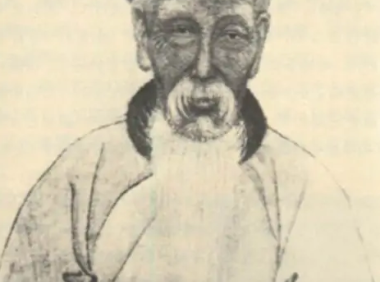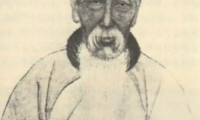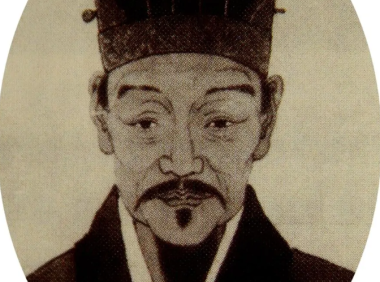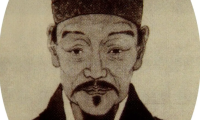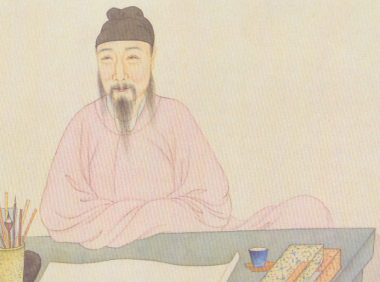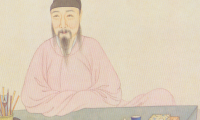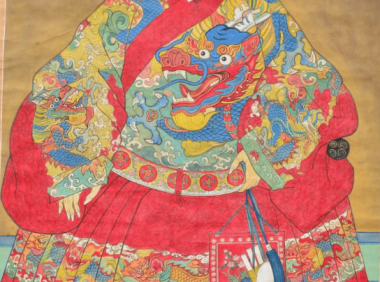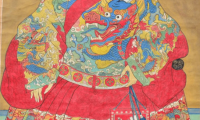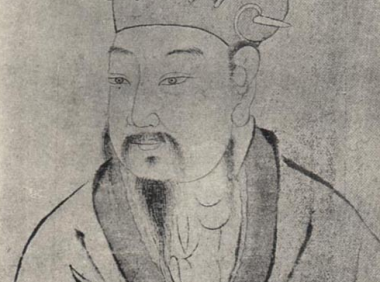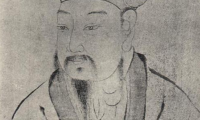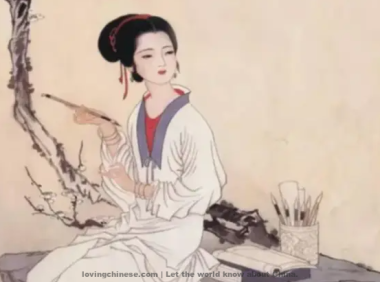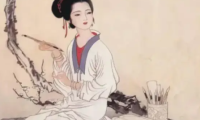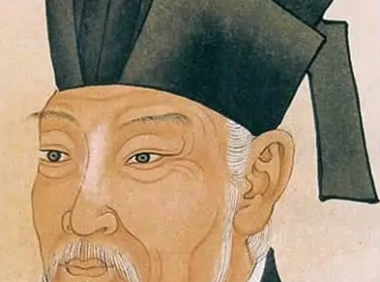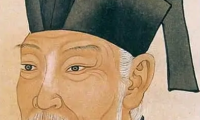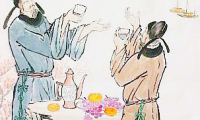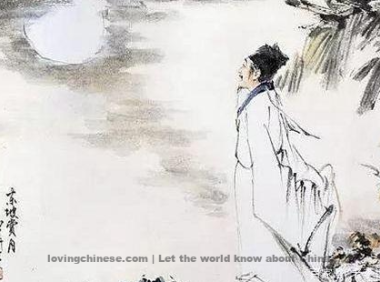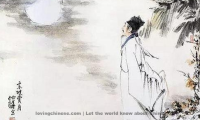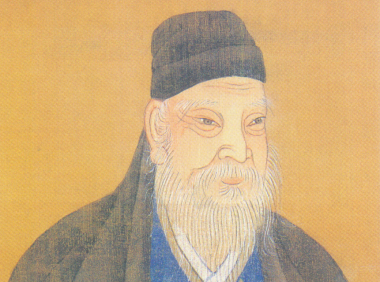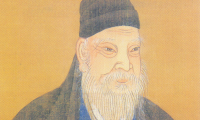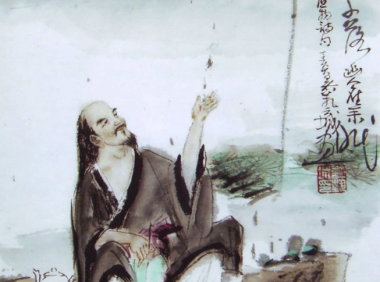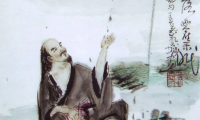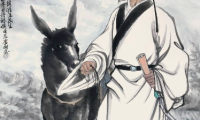-
Yuan Mei Poem: The Chickens – 袁枚《鸡》
鸡 [清]袁枚 养鸡纵[1]鸡食, 鸡肥乃烹之。 主人计自佳, 不可使鸡知。 注释: [1]纵:放纵,任凭。 The Chickens Yuan Mei The chickens eat their fill; They're boiled when fat they grow. The feeder's wise and will; Not let the chickens know. "Chicken" is a five-character quatrain written by Yuan Mei, a poet in the Qing Dynasty. This poem describes a chicken farmer who lets his chickens eat as much as they want, in order to fatten them up so that they can be killed. This plan is of course very clever, but the chickens must not know what he is doing. It contains a satire on the owner's sinister "deep heart" and a pity for the chickens' ignorance and misery. The poem conveys a deep understanding of interpersonal relationships in feudal society and contains a profound philosophy of life....
- 0
- 0
- 24
-
Li Zhi Poem: Sitting Alone – 李贽《独坐》
独坐 [明]李贽 有客开青眼[1], 无人问落花。 暖风熏细草, 凉月照晴沙。 客久翻疑梦, 朋来不忆家。 琴书犹未整, 独坐送晚霞。 注释: [1]青眼:青眼看人是表示对人的重视或尊重,这里指接待朋友来访。 Sitting Alone Li Zhi[1] With friends I open wide my eyes; Friendless, I speak to falling flowers. The slender grass in warm wind sighs; On sparkling sand cool moonlight showers. Life seems a dream in countries strange; Companions make me forget home. My lute and books I won't arrange; I sit to see evening cloud roam. 注释: [1]The poet was an independent philosopher, put to death for his unconventional views. "Sitting Alone" is a five-character regulated verse written by Li Zhi, a thinker and writer in the Ming Dynasty. The first couplet describes the life of living alone, the second couplet describes the change of seasons and shows the scene of sitting alone all year round, the third couplet describes the reason for sitting alone, and the last couplet points out the theme of the quietness of living alone and the indifference of the mind. The whole poem shows the harmony between the author's soul and nature, and the verses are well-balanced and melancholy....
- 0
- 0
- 29
-
Tang Yin Poem: Reflections – 唐寅《感怀》
"Sentiment" is a poem written by Tang Yin, a scholar in the Ming Dynasty....
- 0
- 0
- 32
-
Wang Tingxiang Poem: Ancient Tombs – 王廷相《古陵》
古陵 [明]王廷相 古陵在蒿[1]下, 啼乌在蒿上。 陵中人不闻, 行客自惆怅[2]。 注释: [1]蒿:一种有特殊气味的植物。 [2]惆怅:伤感,愁闷,失意。 Ancient Tombs Wang Tingxiang Old tombs lie under withered grass; Over it cries the crow, alas! The dead within hear not its cry; Alone is grieved the passer-by. "Ancient Mausoleum" is a five-character quatrain. The first two lines of the poem take "Artemisia" as the central viewpoint, flowing up and down, looking down at the ancient mausoleum and looking up at the crying crows; the third line says that the people in the ancient mausoleum "cannot hear" and contrasts the traveler's emotion when hearing the sound; the poem ends with "the traveler is melancholy", the words are finished but the meaning is endless. The whole poem is deliberately open-minded but the emotion is doubly sad, the imagery is clear and the spirit is far-reaching, and it vividly depicts the image of a "traveler" who is melancholy alone....
- 0
- 0
- 36
-
Liu Yin Poem: Song of the White Wild Geese – 刘因《白雁行》
"Song of the White Wild Geese" is a seven-line poem written by Liu Yin, a poet of the Yuan Dynasty....
- 0
- 0
- 23
-
Li Qingzhao: Hidden under leaves shaped like green jade
Li Qingzhao 摊破浣溪沙 . 揉破黄金万点轻 原作:李清照英译:闵晓红 揉破黄金万点轻, 剪成碧玉叶层层。 风度精神如彦辅, 大鲜明。 梅蕊重重何俗甚, 丁香千结苦麄生。 熏透愁人千里梦, 却无情。 Hidden under leaves shaped like green jade - to the tune of Tanpo Huanxisha written by: Li Qingzhao ( 1084 – 1155?) translated by Julia Min Hidden under leaves shaped as green jade are spotted blossoms like golden sun rays. Unworldly as Yanfu, the man of honest grace, she is also a mirror of her soul and pure taste. Plum trees shy away for the cluttered filaments, so are the tacky lilacs arrayed in tiered blossoms. Yet this fragrance, so sensible, kills the romance, and fumigate my sweet dream beyond reasons. For appreciation: This poem could be written by Li Qingzhao as agreed by most scholars. The last sentence could be an indication of the composing time being after she settled in Lin’an where her only hope of returning home is in her dream. Osmanthus together with chrysanthemum, are the most favoured by the Chinese among the few flowers blooming in Autumn, and so they are often the subjects in literature, especially associated with the Moon Festival. The first stanza is on the sensual features concluded with the unique quality of a crystal soul, the highlight…...
- 0
- 0
- 88
-
Li Qingzhao: How deeply shrouded her courtyard had been
Li Qingzhao 临江仙.庭院深深深几许 (欧阳公作《蝶恋花》,有“深深深几许”之句,予酷爱之。 用其语作“庭院深深”数阕,其声即旧《临江仙》也。) 原作:李清照 (宋) 英译:戈登.奥赛茵,闵晓红 庭院深深深几许? 云窗雾阁常扃。 柳梢梅萼渐分明。 春归秣陵树, 人老建康城。 感月吟风多少事, 如今老去无成。 谁怜憔悴更凋零。 试灯无意思, 踏雪没心情。 How deeply shrouded her courtyard had been - to the Tune of Linjiangxian written by Li Qingzhao ( 1084-1155?) translated by Gordon Osing & Julia Min How deeply shrouded her courtyard had been, the windows clouded with mist, chambers shut. But see! The tips of willows, plum buds, and a full Spring returned to the Moling trees, as if for an aging stranger locked in J.K. City. Who sings so softly of the moon and the wind, of getting old too, and cut-off from honors, … and no one pitying her, pallid and withering, too glum for the festival lanterns of Spring, unable to go out in the fresh snow fallen. For appreciation: According to Another Collection of Li Qingzhao, this ci was composed in 1129, after she had joined her husband in Jiankang, now the city of Nanjing. Before the Lantern Festival(元宵节), the last day of Spring Festival (Chinese New Year), people tried on lanterns to be used the next night. Our poet cannot bring herself to participate; she can't give up thinking about her own and her country's sad retreats…...
- 0
- 0
- 72
-
Li Qingzhao: You came to the world on this day of Qiufen
Li Qingzhao 感怀.寒窗败几无书史 (宣和辛丑八月十日到莱,独坐一室,平生所见,皆不在目前。几上有《礼韵》,因信手开之,约以所开为韵作诗,偶得“子”字,因以为韵,作感怀诗。) 原作:李清照(宋) 英译:闵晓红 寒窗败几无书史, 公路可怜合至此。 青州从事孔方兄, 终日纷纷喜生事。 作诗谢绝聊闭门, 燕寝凝香有佳思。 静中吾乃得至交, 乌有先生子虚子。 My Mundane Stay (The day I arrived at Laizhou is marked with a mundane moment at this empty official residence with no interesting books to read only Official Word Dictionary on the table. So I decided to write a poem rhyming the first word shown on the page I randomly opened. There it is, a “zi”(子), thus this poem.) written by: Li Qingzhao ( 1084 – 1155?) translated by Julia Min No books of poetry or history to my taste, just an official dictionary to appreciate. Between meetings, feasting, and money game, he could hardly find himself a decent space. I’d rather be alone at home closing the gate; In the sweet scent of incense I meditate. To echo the rhymes I compose and create; Quietude and Solitude are new friends I made. Appreciation: This poem is an extempore effusion, or a spur of the moment, written in 1121 when Yi’an joined her husband in Laizhou. Being newly appointed to the prefectural post, Zhao Mingcheng had to attend many official duties and social meetings, thus he could hardly afford time for her wife, not to mention…...
- 0
- 0
- 67
-
Li Qingzhao: Her Boughs are Thinly Spotted, Poised for Grace
Li Qingzhao 忆少年.疏疏整整 原作:李清照(存疑) 英译:闵晓红 疏疏整整, 斜斜淡淡, 盈盈脉脉。 徒怜暗香句, 笑梨花颜色。 羁马萧萧行又急。 空回首、 水寒沙白。 天涯倦牢落, 忍一声羌笛。 Her Boughs are Thinly Spotted, Poised for Grace - to the musical tune ‘The Young Days’ written by Li Qingzhao (12th Century) trans. by Julia Min Her boughs are thinly spotted, poised for grace. A light touch of pink jade on her dewy face, like young love, her eyes ripple gleaming waves. I’m fond of the phrase ‘the roaming perfume’, but amused by some poet’s ‘pale pear blossoms’. Horses are galloping to keep the running pace. From the carriage window I look back in vain, - just a world of dark waters and white sands behind. The flute music of “Fallen Blooms” seems in play. Ahead, who knows what desolate places await. Appreciation: It has been argued among the scholars whether this piece was composed by Yi’an ( Li Qingzhao’s social name). The whole poem is about a desolate traveller on the run from disasters, enriched with association through the comparison of two flowers, with one shown and one hidden for you to figure out as in an intellectual guessing game. From the provided hints ‘the roaming perfume’ and ‘The flute music of “Fallen Bloom”…...
- 0
- 0
- 69
-
白居易《与梦得沽酒闲饮且约后期》- Poems of Bai Juyi | Chinese poet
Bai Juyi 与梦得沽酒[1]闲饮且约后期[2] 少时犹不忧生计, 老后谁能惜酒钱? 共把十千[3]沽一斗, 相看七十欠三年。 闲征雅令穷经史, 醉听清吟胜管弦。 更待菊黄[4]家酿熟, 共君一醉一陶然[5]。 此时,白居易和刘禹锡(梦得)同在洛阳,白居易任太子少傅,是个闲职。二人饮酒闲谈,回首平生,难免有“早岁那知世事艰”的感慨。两人争着付钱买酒,相看都已67岁,虽有高雅情怀,却只能引经据史,行行酒令,听听知己的“清吟”奏出心灵的乐章而已。二人相约等到重阳佳节,家酿的菊花酒熟了,再到家里会饮,更能消愁解闷。全诗言简意富,语淡情长,见出炉火纯青的艺术功力。 注释: [1]沽酒:买酒。 [2]后期:后会之期,再次相聚的日期。 [3]十千:十千钱,极言酒价之高以表二人尽兴豪饮。 [4]菊黄:菊花盛开的时节,通常指代重阳节。 [5]陶然:闲适愉悦的样子。 Drinking Together with Liu Yuxi While young, I was not worried about livelihood. Now old, how could I grudge money for buying wine? Let’s spend ten thousand coins for a jarful of drink good! Looking in face, two years more we’ll be sixty-nine. We read and play the drinkers’ wager game at leisure; Drunk, we listen to verse better than music light. When chrysanthemums yellow, may I have the pleasure To invite you to drink my home-brew with delight?...
- 0
- 0
- 44
-
白居易《览卢子蒙侍御旧诗,多与微之唱和,感今伤昔,因赠子蒙,题于卷后》- Poems of Bai Juyi | Chinese poet
Bai Juyi 览卢子蒙侍御旧诗,多与微之唱和,感今伤昔,因赠子蒙,题于卷后 昔闻元九咏君诗, 恨与卢君相识迟。 今日逢君开旧卷, 卷中多道赠微之。 相看泪眼情难说, 别有伤心事岂知? 闻道[1]咸阳坟上树, 已抽三丈白杨枝。 白居易晚年与卢子蒙侍御交往,公元841年翻阅卢子蒙的旧诗集,发现不少诗是赠给元稹(元九,字微之)的,而元稹去世已经10年了。白居易不禁心酸,就写下了这首诗。头两句把30年前与元稹论诗衡文、谈笑风生的情景,重新展现在眼前。三、四句写今日与卢子蒙聚首,共同批阅他赠元稹的诗。五、六句写两个老人你望着我,我望着你,却都不说一句话。最后说,元稹坟上的白杨树枝都已三丈长了,树犹如此,人何以堪?这首七律悼念亡友,是一首情真意深的作品。 注释: [1]闻道:听闻,听说。 On Reading Lu Zimeng’s Old Poems Writtenin the Same Rhyme Schemes as Yuan Zhen’s Poems I have read Yuan Zhen’s verse on you of early date, And I regret not to have known you till so late. Today we read your verse together to the end, I find so many poems on our deceased friend. Looking at you in tears, what can I say at last? Who else can know what broke my poor heart in the past? I’ve heard say poplar trees in old capital loom With branches thirty feet long over our friend’s tomb....
- 0
- 0
- 20
-
白居易《勤政楼西老柳》 – Bai Juyi English Translations – Chinese Poems
Bai Juyi 勤政楼[1]西老柳 半朽临风树, 多情立马人。 开元[2]一枝柳, 长庆二年[3]春。 勤政楼西边的老柳树是唐玄宗开元年间(713—741)种的,到了长庆二年(822),已经有100年左右的历史了。当时白居易51岁,也是半朽之人,见了半朽之树,所以立马良久,凝望出神,处在物我交融的境界。前两句用画笔勾勒了一幅临风立马图,语短情长,意境苍茫;后两句用史笔补叙了柳树和诗人的年龄,隐含了百年变迁、自然变化、人世沧桑的感慨在内,是一幅充满了感情的生活小照。 注释: [1]勤政楼:位于长安兴庆宫西南,始建于开元八年(720年)。 [2]开元:唐玄宗年号,公元713年至741年。 [3]长庆二年:唐穆宗李恒在位第二年,即公元822年。 The Old Willow Tree West of the Administrative Hall In breeze stands a half-withered tree; Looking at it on horse has oldened me. The tree’s seen ups and downs for years; For fifty-one springs I’ve shed tears....
- 0
- 0
- 21
-
白居易《西湖晚归回望孤山寺赠诸客》 – Bai Juyi English Translations – Chinese Poems
Bai Juyi 西湖晚归回望孤山寺赠诸客 柳湖[1]松岛莲花寺, 晚动归桡[2]出道场。 卢橘子[3]低山雨重[4], 栟榈叶战水风凉。 烟波澹荡[5]摇空碧, 楼殿参差倚夕阳。 到岸请君回首望, 蓬莱宫在海中央。 白居易在杭州时,常同宾客去垂柳掩映的西湖,青松劲立的孤山,莲花盛开的寺院,听僧侣在佛殿讲经,直到傍晚才离开庙堂,坐船回城。途中看到雨后的卢橘的果实把枝压得低垂下来,栟榈树高叶大,俨若凉扇遮径,清风一起,阔叶颤动,似乎感到了水风的清凉。在宽阔的湖面上,轻轻的寒烟似有似无,蓝蓝的湖波共长天一色。随着山势高下而建筑的佛寺楼殿,在夕阳残照下,金光明灭,仿佛神话中的海上蓬莱仙山,而孤山寺中又有蓬莱阁,更使佛地有如仙境。这首诗句句写景,句句含情,给人以情景交融的快感。 注释: [1]柳湖:西湖周边多柳树,故称“柳湖”。 [2]归桡(ráo):归船;桡,本意为船桨。 [3]卢橘子:又名“给客橙”,与橘子近似。 [4]重(zhònɡ):沉重。 [5]澹(dàn)荡:荡漾,使人舒畅。 Looking Back at the Lonely Hillon My Way across West Lake From Lotus Temple, isle of pines in willow-girt lake, The guests come out at dusk the oarsmen’s boat to take. After the rain, loquats hang heavy on the trees, The waterside palm leaves shiver in the cool breeze. The misty waves seem to blend with the azure sky, The setting sun reddens pavilions low and high. Will you, on reaching the shore, turn your head to see The fairy palaces in the midst of the sea?...
- 0
- 0
- 35
-
Bai Juyi Poems: Written at Random – 白居易《放言》
A poem written by Bai Juyi, a poet of the Tang Dynasty. It is a good poem rich in reasoning....
- 0
- 0
- 16
-
Li Pai: Drinking by the Tungting Lake (One of Three Poems) ~李白·《陪侍郎叔游洞庭醉后(其三)》 with English Translations
"Three Poems after Drunkenness While Accompanying Uncle Shilang on a Tour of Dongting Lake" is a collection of poems by Li Bai, a great poet of the Tang Dynasty....
- 0
- 0
- 104
-
Su Dongpo: Memories of Red Cliff
Su shi Memories of Red Cliff 赤壁怀古 大 江 东 去 , 浪 淘 尽千 古 风 流 人 物。故 垒 西 边, 人 道 是三 国 周 郎 赤 壁。 乱 石 穿 空, 惊 涛 拍 岸卷 起 千 堆 雪。江 山 如 画一 时 多 少 豪 杰! 遥 想 公 瑾 当 年小 乔 初 嫁 了雄 姿 英 发。羽 扇 纶 巾, 谈 笑 间 樯 橹 灰 飞 烟 灭。故 国 神 游, 多 情 应 笑 我早 生 华 发 。人 生 如 梦一 樽 还 酹 江 月。 Chi Bi Huai Gu Da jiang dong qu, lang tao jinQian gu feng liu ren wu.Gu lei xi bian, ren dao shiSan guo zhou lang chi bi. Luan shi chuan kong, jing tao pai anJuan qi qian dui xue.Jiang shan ru huaYi shi duo shao hao jie ! Yao xiang gong jin dang nianXiao qiao chu jia leXiong zi ying fa.Yu shan guan jin, tan xiao jian, Qiang lu hui fei yan mie.Gu guo shen you, duo qing ying xiao woZao sheng hua fa.Ren sheng ru mengYi zun hai lei jiang yue. Memories of Red Cliff Large river turns to the eastWaves…...
- 0
- 0
- 47
-
Meng Haoran: Written for an Abbot’s Cell ~ 《题大禹寺义公禅房》 孟浩然 with English Translations
Meng Haoran 《题大禹寺义公禅房》是唐代诗人孟浩然创作的一首五言律诗。这是一首题赞诗,也是一首山水诗。此诗抒写了义公超尘脱俗、心洁如莲的美好品质。前两联描绘出禅房周围寂静、淡雅的环境,烘托了义公的潜心修禅、清心寡欲。颈联写天气变化时禅房的别样景观。尾联点明义公品行高洁如莲花一尘不染,表达了诗人对义公纯洁心境的感叹与赞美。全诗以突出“清净”为主,由景清写到心净,层层递进,相互照应,笔致疏淡,意境清远,淡人心魄,用语明朗轻快,词采清雅秀丽。 《题大禹寺义公禅房》 孟浩然 义公习禅寂,结宇依空林。户外一峰秀,阶前众壑深。夕阳连雨足,空翠落庭阴。看取莲花净,方知不染心。 Written for an Abbot's Cell Meng Haoran Used to meditation with ease,You build your hut under the trees.Outdoors a peak towers so steep;Before your steps sing fountains deep.Sunset is moistened after rain,Green drizzles in the court remain.Seeing the lotus blossoms pure,I know your purity endure....
- 0
- 0
- 90
-
Mao Haoran: Dining in Taoist Priest Mei’s Mountain Hut ~ 《清明日宴梅道士房》 孟浩然 with English Translations
Meng Haoran 《清明日宴梅道士房》是唐代诗人孟浩然的作品。此诗写梅道士邀饮过程,吟咏道士山房中的景物,流露出隐逸情趣,反映了作者失意之余的离俗之感。诗的前半部分写作者在赏玩春景时,忽然被邀到梅道士家;后半部分热情赞叹梅道士的生涯。全诗巧妙运用了与道士有关的术语及典故,涉笔成趣,幽默明快,自然天成。 《清明日宴梅道士房》 孟浩然 林卧愁春尽,搴帷见物华。忽逢青鸟使,邀入赤松家。金灶初开火,仙桃正发花。童颜若可驻,何惜醉流霞。 Dining in Taoist Priest Mei's Mountain Hut Mao Haoran Awaking in the woods I fear that the spring wanes and thins;Drawing apart the curtains I feast on the lovely scenes.Unexpectedly comes the fairy messenger Bluebird,Inviting me to Chisongzi's home in the fairy world.The alchemy furnace is set to make flames which bloom;The buds of the immortal peaches are coming into bloom.Could they keep one's childish features forever and ever,Why can't we be drunk with a nectar of holy flavor?...
- 0
- 0
- 87
-
Meng Haoran Poem: Written for an Abbot’s Cell – 孟浩然《题义公禅房》
Meng Haoran 题义公禅房[1] 孟浩然 义公习[2]禅寂[3], 结宇[4]依空林[5]。 户外一峰秀, 阶前众壑[6]深。 夕阳连雨足[7], 空翠[8]落庭阴。 看取莲花净, 方知不染心[9]。 注释: [1] 这首诗写一个幽静的地方,由此衬托出一个幽静的性格,这是典型环境中的典型人物。 [2] 习:习惯,喜欢。 [3] 禅寂:禅定。 [4] 结宇:建造房屋。 [5] 空林:空旷寂静的山林。 [6] 壑:山谷。 [7] 雨足:久雨初停。 [8] 空翠:苍翠的山色。 [9] 不染心:一尘不染。 Written for an Abbot's Cell Meng Haoran Used to meditation with ease, You build your hut under the trees. Outdoors a peak towers so steep; Before your steps sing fountains deep. Sunset is moistened after rain, Green drizzles in the court remain. Seeing the lotus blossoms pure, I know your purity endure. 《题大禹寺义公禅房》是唐代诗人孟浩然创作的一首五言律诗。这是一首题赞诗,也是一首山水诗。此诗抒写了义公超尘脱俗、心洁如莲的美好品质。前两联描绘出禅房周围寂静、淡雅的环境,烘托了义公的潜心修禅、清心寡欲。颈联写天气变化时禅房的别样景观。尾联点明义公品行高洁如莲花一尘不染,表达了诗人对义公纯洁心境的感叹与赞美。全诗以突出“清净”为主,由景清写到心净,层层递进,相互照应,笔致疏淡,意境清远,淡人心魄,用语明朗轻快,词采清雅秀丽。 A poem in five lines written by Meng Haoran, a poet of the Tang Dynasty, is entitled "The Zen Room of Yi Gong of Dayu Temple". It is a poem of praise and a landscape poem. The poem expresses the beautiful qualities of Yigong, who is beyond the mundane and has a pure heart like a lotus. The first two lines depict the silent and elegant environment around the meditation room, which emphasizes Yi Gong's deep-rooted meditation practice and pure heart. The neck couplet describes the different landscape of the meditation room when the weather changes. The last couplet points out that Yi Gong is as pure as a lotus flower, expressing the poet's admiration and praise for his pure state of mind. The poem…...
- 0
- 0
- 13
-
Wei Yingwu: By Way of Han Yuguan
Wei Yingwu By Way of Han Yuguan 经函谷关 洪 河 绝 山 根单 轨 出 其 侧。万 古 为 要 枢往 来 何 时 息? 秦 皇 既 恃 险海 内 被 吞 食。及 嗣 同 覆 颠。咽 喉 莫 能 塞。 炎 灵 讵 西 驾娄 子 非 经 国。徒 欲 扼 诸 侯不 知 恢 至 德。 圣 朝 及 天 宝豺 虎 起 东 北。下 沉 战 死 魂上 结 穷 冤 色。 古 今 虽 共 守成 败 良 可 识。藩 屏 无 俊 贤金 汤 独 何 力!驰 车 一 登 眺感 慨 中 自 恻。 Jing Han Gu Guan Hong he jue shan genDan gui chu qi ce.Wan gu wei yao shuWang lai he shi xi? Qin huang ji shi xianHai nei fei tun shi.Ji si tong fu dianYan hou mo neng sai. Yan ling ju xi jiaLou zi bei jing guo.Tu yu e zhu houBu zhi hui zhi de. Sheng zhao ji tian baoChai hu qi dong bei.Xia chen zhan si hunShang jie qiong yuan se. Gu jin sui gong shouCheng bai liang ke shi.Fan bing wu jun xianJin tang du he li !Chi che yi deng tiaoGan kai zhong zi ce.…...
- 0
- 0
- 22
-
Wei Yingwu: Cuckoo Bird Cries
Wei Yingwu Cuckoo Bird Cries 子规啼 高 林 滴 露 夏 夜 清南 山 子 规 啼 一 声。 邻 家 孀 妇 抱 儿 泣我 独 展 转 何 时 明! Zi Gui Ti Gao lin di lu xia ye qingNan shan zi gui ti yi sheng. Lin jia shuang fu bao er qiWo du zhan zhuan he shi ming. Cuckoo Bird Cries Tall forest, clear summer night with dripping dewSouthern mountain cuckoo bird sounds one after another. Neighbor’s house frosty, widowed mother embraces her child with tearsI toss and turn alone in bed, how to make known these times. Notes: Cuckoo birds: They symbolized the expression, “Come back to me”. Commentary: Wei is also thinking of his deceased spouse....
- 0
- 0
- 7
-
Wei Yingwu: Go Back to My Former Officials House Along With Zhao Guoli
Wei Yingwu Go Back to My Former Officials House Along With Zhao Guoli 过昭国里故第 不 复 见 故 人一 来 过 故 宅。物 变 知 景 暄心 伤 觉 时 寂。 池 荒 野 筠 合庭 绿 幽 草 积。风 散 花 意 谢鸟 还 山 光 夕。 宿 昔 方 同 赏讵 知 今 念 昔。缄 室 在 东 厢遗 器 不 忍 觌。 柔 翰 全 分 意芳 巾 尚 染 泽。残 工 委 筐 箧馀 素 经 刀 尺。 收 此 还 我 家将 还 复 愁 惕。永 绝 携 手 欢空 存 旧 行 迹。 冥 冥 独 无 语杳 杳 将 何 适。唯 思 古 今 同时 缓 伤 与 戚。 Guo Zhao Guo Li Gu Di Bu fu jian gu renYi lai guo gu zhai.Wu bian zhi jing xuanXin shang jue shi ji. Chi huang ye yun heTing lu you cao ji.Feng san hua yi xieNiao huan shan guang xi. Su xi fang tong shangJu zhi jin nian xi.Jian shi zai dong xiangYi qi bu ren di. Rou han quan fen yiFang jin shang ran ze.Can gong wei kuang qieYu su jing dao chi. Shou ci huan wo jiaJiang huan fu chou ti.Yong…...
- 0
- 0
- 15
-
Wei Yingwu: Hometown House in Zhao Guoli, Listen to Mr. Yuan: Qin Player and Teacher
Wei Yingwu Hometown House in Zhao Guoli, Listen to Mr Yuan: Qin Player and Teacher 昭国里第听元老师弹琴 竹 林 高 宇 霜 露 清朱 丝 玉 徽 多 故 情。 暗 识 啼 乌 与 别 鹤只缘中有断肠声。 Zhao Guo Li Di Ting Yuan Lao Shi Tan Qin Zhu lin gao yu shuang lu qingZhu si yu hui duo gu qing. An shi ti wu yu bie heZhi yuan zhong you duan chang sheng. Hometown House in Zhao Guoli, Listen to Mr. Yuan: Qin Player and Teacher Tall bamboo forest leaves, frost and dew is clear and coldVermillion silk strings, fine jade designs, a qin making the music thatreminds us of many former emotions. …...
- 0
- 0
- 13
-
Du Fu: Headwaters of the Chu River Melancholy
dufu Headwaters of the Chu River Melancholy 哀江头 少 陵 野 老 吞 声 哭春 日 潜 行 曲 江 曲。江 头 宫 殿 锁 千 门细 柳 新 蒲 为 谁 绿 ? 忆 昔 霓 旌 下 南 苑苑 中 万 物 生 颜 色。昭 阳 殿 里 第 一 人同 辇 随 君 侍 君 侧。 辇 前 才 人 带 弓 箭白 马 嚼 啮 黄 金 勒。翻 身 向 天 仰 射 云一 笑 正 坠 双 飞翼。 明 眸 皓 齿 今 何 在?血 污 游 魂 归 不 得。清 渭 东 流 剑 阁 深去 住 彼 此 无 消 息。 人 生 有 情 泪 沾 臆江 水 江 花 岂 终 极?黄 昏 胡 骑 尘 满 城欲 往 城 南 望 城 北。 Ai Jiang Tou Shao ling ye lao tun sheng kuChun ri qian xing qu jiang qu.Jiang tou gong dian suo qian menXi liu xin pu wei shei lu? Yi xi ni jing xia nan yuanYuan zhong wan wu sheng yan se.Zhao yang dian li di yi renTong nian sui jun shi jun ce. Nian qian cai ren dai gong jianBai ma jiao nie huang jin lei.Fan…...
- 0
- 0
- 24













